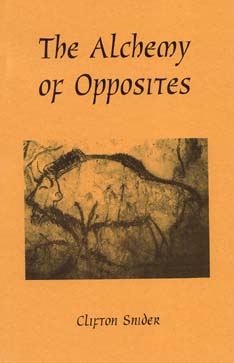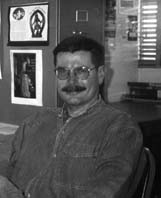The Alchemy of Opposites,
poems by Clifton Snider

My longest book of poems (144 pages),
The Alchemy of Opposites contains all the poems
that I wish to preserve written since
1992 to its publication in 2000.
Although a favorite topic is the natural world
(animals, plants, earth, the cosmos),
I also appropriate images from various
mythologies (including that of Native Americans,
particularly the Zuni people, the ancient Nordic
peoples, and the Bible), and I write about people
I never knew personally (Christina Rossetti,
Klaus Nomi, Sylvester, Freddie Mercury,
Jackie Kennedy Onassis, River Phoenix, Selena,
Leni Riefenstahl, Mickey Mantle, Roy Rogers, and Edgar Degas).
Most of the poetry is centered in my own experience, my
travels in New Mexico, Canada, Mexico, Costa Rica, and Europe,
my loss of friends, a brother, and a former lover to AIDS, murder,
and suicide, my personal search for roots, love, and meaning--
in other words, for transcendence.
The prehistoric picture of a bison with its
sort of double head (the head of a second bison
overlaps the head of the first one) from France's
Cave of Niaux on the cover is an image of the same
bison I saw at the Cave of Niaux, and the subject
of the final poem in my book. What I experienced
there in the dark of that deep and enormous cave
was a primal, spiritual experience. I hope
it reinforces my central theme:
the possibility of wholeness from
disparate sources, even if only
for one burning moment.

The March-April 2001 issue of the Small Press Review proclaims
the following about The Alchemy of Opposites:
Clifton Snider has been writing and publishing
for over
25 years to establish
himself as one of American's best . . . contemporary
poets.
The Alchemy of Opposites . . .
stands as his most outstanding book to date . . .
[with]
poignant poetry which is highly crafted
and easy to read. But despite the massive
amount
of loss dealt with here, the book is strangely
comic, even optimistic and upbeat in many ways.
--Eva von Kesselhausen
Click here to read the Full
Text.
The International
Gay & Lesbian Review, published by the University of
Southern California, says that "The Alchemy of Opposites is
Clifton Snider's . . . best work in verse, his most personal and
moving"; and the reviewer admires "Snider's emotional directness and
the admirable accessibility of
his imagery. . . . The Alchemy of Opposites, indeed contains
outcroppings
of pure gold."
--review
by Arnold T. Schwab
To read the full text of the review,
click on the
title
of the journal above.
James Benedict writes: "Written on the
premise that profound experience can be found wherever we are, if only
we care to look, [
The Alchemy of
Opposites is] . . . a sequence of strong poems dealing with loss
interspersed with nature
poems, poems on art and artists, poems of love and friendship [and]
spirit of place . . . . Snider's theoretical and practical
focus on alchemy as a vessel of healing and individuation is part of
the tradition of alchemical revival initiated by James Joyce in
Finnegan's Wake, and explored by
Patrick White, Vladimir Nabokov, Gabriel Marquez, etc. In this
chronicle of spiritual work related to loss and grief Snider's stamina
shines through every poem . . . ."
--
The Chiron Review
Click here to read the an updated version of Benedict's review from the
online journal,
Gay Today.

Chiron Review Press
Michael Hathaway, Editor/Publisher
522 E. South Avenue
St. John, KS 67576-2212
E-mail: chironreview@earthlink.net
or go to Chiron
Review
Press.
Author photo by Tim Fischer.
Comments about Clifton Snider's other books of poetry:
Jesse Comes Back (1976):
Clifton Snider's book of poems, Jesse Comes Back, impressed me
very
much. It is very seldom that I . . . can recommend ["a book by a young
poet"]
as highly as this one.
--Christopher Isherwood
Snider is one of our very few young poets to make a happy marriage
of scholarship
and imagination.
--Gerald Locklin, Small Press Review
Bad Smoke Good Body (1980):
Bad Smoke Good Body is a beautiful and powerful little
book.
--William Meredith, former Poetry Consultant to The Library of Congress
In Bad Smoke Good Body . . . Snider turns to
powerfully evoked,
emotional images. . . .
--Leo Mailman, Maelstrom Review
Jesse and His Son (1982):
. . . just the right amount of pustule, dope and transcendentalism
fused.
--Robert Peters, author of Hunting the Snark
Edwin: A Character in Poems (1984):
Clifton Snider has chosen to depict his character, Edwin, with a clean
story-like
style of imagist opinions rather than narrative involvements. His work
becomes
insightful and evocative when the images get bawdy and he allows his
superb
sense of humor to come into play.
--Jenifer Tener, Electrum
Blood & Bones (1988):
This volume . . . completes, with the dropping of the "Jesse" and
"Edwin" personae, [Snider's] transition from modern to postmodern
artist. The confidence he now exhibits renders accessible to artistic
use a rich though often painful
personal history.
--Gerald Locklin, Western American Literature
This book does not paint a pretty picture, and the squeamish should
steer
clear. But Mr. Snider is a definite talent, a unique voice, and an
original
thinker.
--Eva Von Kesselhausen, Blue Light Review
Southern California poet Clifton Snider explores the unexpected, the
near
tragic, and the adventurous. In three sections, he writes of a
trip
through Europe in the '70s, of his sudden hospitalization with a
bleeding
ulcer, and of his return to travel in Europe in the mid '80s.
Poems
of the first trip are soaked with the blood oozing into his guts; poems
of
the second trip reflect good health, a good eye, and maturity.
The
contrast is appealing; the poems, beguiling.
--Richard Labonte, The Advocate
Impervious to Piranhas (1989):
Snider writes with an extreme economy of words, and focuses most of his
book
on one subject: pain felt by people. . . . he does get at some gleaming
insights.
. . .
--Factsheet Five
The Age of the Mother (1992):
In these beautifully spare words, Snider weaves personal mantras of
birth,
death, and transcendence. He announces the return of the Goddess after
centuries
of patriarchal dominance.
--Glenn Bach, Small Press Review
Out of . . . profound insight and spiritual wisdom he . . . has
created an offering, a magnificent poetic vision, a prayer-book for the
coming New
Age.
--Marilyn Johnson, Pearl
Clifton Snider is a brave man. . . . he is also a shaman, a
journeyer, a traveler who sees past and present interleaving and
co-existing. . . .
These poems touch something deep and almost forgotten so that you have
to
remember and know as if for the first time.
--Richard Lee, author of As Is and The Circumstances of
Birds
My new book of poems, Aspens in the Wind, is now available from Chiron
Review Press.
To read a few of the poems in The Alchemy of Opposites,
click
on the following:
Art and Poetry (for "Aspen in the Wind").
The Cave of Niaux.
Le Mont Saint-Michel.
Mountain Lion.
My Selena.
See also New Age.
To read more about The Age of the Mother and my book of Jungian
literary
criticism, click on
Poetry and Criticism.
And if you wish to read about my earlier books, go to
Clifton Snider, Poet.
Read about my novels, Wrestling
with
Angels, Bare Roots, and, Loud Whisper.
Return to Top.
Home.
Page last revised: 29 August 2009


